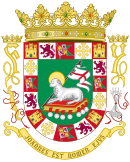 |
|---|
General elections were held in Puerto Rico in 1902. Federico Degetau was re-elected as Resident Commissioner. [1]
 |
|---|
General elections were held in Puerto Rico in 1902. Federico Degetau was re-elected as Resident Commissioner. [1]
| Candidate | Party | Votes | % | |
|---|---|---|---|---|
| Federico Degetau | Republican Party | 73,823 | 68.08 | |
| Felipe Cuebas-Arredondo | Federal Party | 34,605 | 31.92 | |
| Total | 108,428 | 100.00 | ||
| Source: Nolla | ||||

Puerto Rico, officially the Commonwealth of Puerto Rico, is a Caribbean island, Commonwealth, and unincorporated territory of the United States. It is located in the northeast Caribbean Sea, approximately 1,000 miles (1,600 km) southeast of Miami, Florida, between the Dominican Republic and the U.S. Virgin Islands, and includes the eponymous main island and several smaller islands, such as Mona, Culebra, and Vieques. With roughly 3.2 million residents, it is divided into 78 municipalities, of which the most populous is the capital municipality of San Juan. Spanish and English are the official languages of the executive branch of government, though Spanish predominates.

The politics of Puerto Rico take place in the framework of a democratic republic form of government that is under the jurisdiction and sovereignty of the United States Congress as an organized unincorporated territory. Since the 1898 invasion of Puerto Rico by the United States during the Spanish–American War, politics in Puerto Rico have been significantly shaped by its status as territory of the United States. The nature of Puerto Rico's political relationship with the United States is the subject of ongoing debate in Puerto Rico, in the United States, the United Nations and the international community, with all major political parties in the archipelago calling it a colonial relationship.

Carlos Antonio Romero Barceló was a Puerto Rican politician who served as the governor of Puerto Rico from 1977 to 1985. He was the second governor to be elected from the New Progressive Party (PNP). He also served 2 terms in Congress as the Resident Commissioner of Puerto Rico from 1993 to 2001.
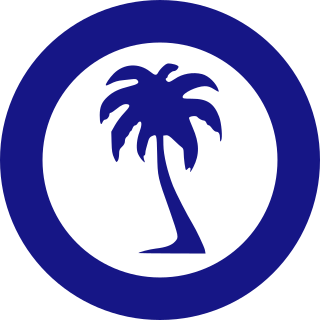
The New Progressive Party is a political party in Puerto Rico that advocates statehood. The PNP is one of the two major parties in Puerto Rico with significant political strength and currently holds both the seat of the governor and of the resident commissioner.
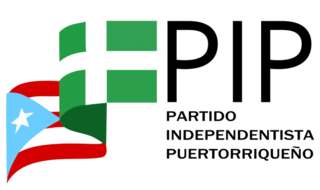
The Puerto Rican Independence Party is a social-democratic political party in Puerto Rico that campaigns for the independence of Puerto Rico from the United States.
The posts of shadow United States senator and shadow United States representative are held by elected or appointed government officials from subnational polities of the United States that lack congressional vote. While these officials are not seated in either chamber of Congress, they seek recognition for their subnational polity, up to full statehood. This would enfranchise them with full voting rights on the floor of the US House and Senate, alongside existing states. As of 2021, only the District of Columbia and Puerto Rico currently have authorized shadow delegations to Congress.
Commonwealth is a term used by two unincorporated territories of the United States in their full official names, which are the Northern Mariana Islands, whose full name is Commonwealth of the Northern Mariana Islands, and Puerto Rico, which is named Commonwealth of Puerto Rico in English and Estado Libre Asociado de Puerto Rico in Spanish, translating to "Free Associated State of Puerto Rico." The term was also used by the Philippines during most of its period under U.S. sovereignty, when it was officially called the Commonwealth of the Philippines.
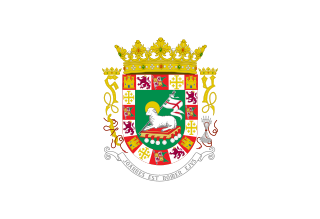
The governor of Puerto Rico is the head of government of the Commonwealth of Puerto Rico, and commander-in-chief of the Puerto Rico National Guard.

General elections were held in Puerto Rico on Tuesday, November 2, 2004. After a count by the State Commission of Elections, the winner was inaugurated to a four-year term as Governor of Puerto Rico on January 2, 2005.

The Senate of Puerto Rico is the upper house of the Legislative Assembly of Puerto Rico, the territorial legislature of Puerto Rico. The Senate, together with the House of Representatives of Puerto Rico, control the legislative branch of the government of Puerto Rico.

The House of Representatives of Puerto Rico is the lower house of the Legislative Assembly of Puerto Rico, the bicameral territorial legislature of Puerto Rico. The House, together with the Senate, control the legislative branch of the government of Puerto Rico.
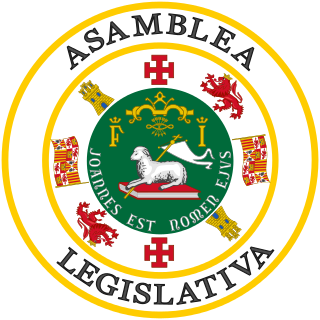
The Legislative Assembly of Puerto Rico is the territorial legislature of the Commonwealth of Puerto Rico, responsible for the legislative branch of the government of Puerto Rico. The Assembly is a bicameral legislature consisting of an upper house, the Senate normally composed of 27 senators, and the lower house, the House of Representatives normally consisting of 51 representatives. Eleven members of each house are elected at-large rather than from a specific legislative district with all members being elected for a four-year term without term limits.

Elections in Puerto Rico are guaranteed by Article Six of the Constitution of Puerto Rico and the Electoral Code of Puerto Rico for the 21st Century Act. All processes are overseen and managed in whole by the Puerto Rico State Elections Commission; an autonomous agency of the executive branch of the government of Puerto Rico.

General elections were held in Puerto Rico on Tuesday, November 4, 2008, to elect the officials of the government that would serve for the next four years, most notably the Governor of Puerto Rico.

Jenniffer Aydin González Colón is a Puerto Rican politician who serves as the 20th Resident Commissioner of Puerto Rico. González has served in leadership positions in the New Progressive Party of Puerto Rico (PNP) and in the Republican Party of the United States. These positions included being the chairwoman of the Puerto Rico Republican Party, speaker and minority leader of the House of Representatives of Puerto Rico, and vice-chair of the PNP. González is the youngest person to be Resident Commissioner and the first woman to hold the role.

Pedro Rafael Pierluisi Urrutia is a Puerto Rican politician and lawyer currently serving as governor of Puerto Rico since January 2, 2021. He has previously served as secretary of justice, resident commissioner, acting secretary of state, de facto governor of Puerto Rico and as private attorney for Puerto Rico's fiscal oversight board under the Puerto Rico Oversight, Management, and Economic Stability Act. He is a member of the New Progressive Party and the Democratic Party of the United States.

The Puerto Rico statehood movement aims to make Puerto Rico a state of the United States. Puerto Rico is an unincorporated territorial possession of the United States acquired in 1898 following the Spanish–American War, making it "the oldest colony in the modern world". As of 2023, the population of Puerto Rico is 3.2 million, around half the average state population and higher than that of 19 U.S. states. Statehood is one of several competing options for the future political status of Puerto Rico, including: maintaining its current status, becoming fully independent, or becoming a freely associated state. Puerto Rico has held six referendums on the topic. These are non-binding, as the power to grant statehood lies with the US Congress. The most recent referendum was in November 2020, with a majority (52.52%) of those who voted opting for statehood.

The Popular Democratic Party is a political party in Puerto Rico that advocates to continue as a Commonwealth of the United States with self-governance. The party was founded in 1938 by dissidents from the Puerto Rican Liberal Party and the Unionist Party and originally promoted policies on the center-left. In recent years, however, its leaders have described the party as centrist.
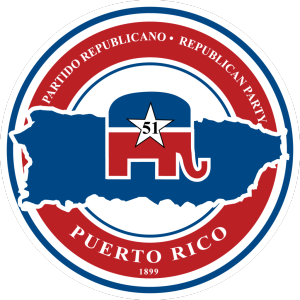
The Republican Party of Puerto Rico is the local affiliate of the national United States Republican Party in Puerto Rico. The affiliation started in 1903. The party does not participate in the November elections mandated by the Constitution of Puerto Rico for local registered political parties because it is not a registered party in Puerto Rico for local electoral purposes. Instead, the party holds its own elections to select the Puerto Rico delegates to the Republican National Convention and holds presidential primaries on the last Sunday of February.

San Juan, Puerto Rico, held an election for mayor on November 3, 2020. Among other elections, it was held concurrently with the 2020 Puerto Rico gubernatorial election. It saw the election of New Progressive Party nominee Miguel Romero.